The situation in Texas and its four big metros, Houston, Dallas-Fort Worth, Austin, and San Antonio.
By Wolf Richter for WOLF STREET.
The price cutting has started in a serious way in Texas, after the mindboggling price explosion. The number of homes on the market with “reduced” listing prices jumped by 26% from a year ago, to the highest level in the decade-long dataset by realtor.com, and up by 49% from June 2019.
Price cuts, if initial listing prices are too high, and lower prices in general are what it takes in this market where prices had exploded in prior years, and where demand has then fizzled, and where inventory is now blowing out.
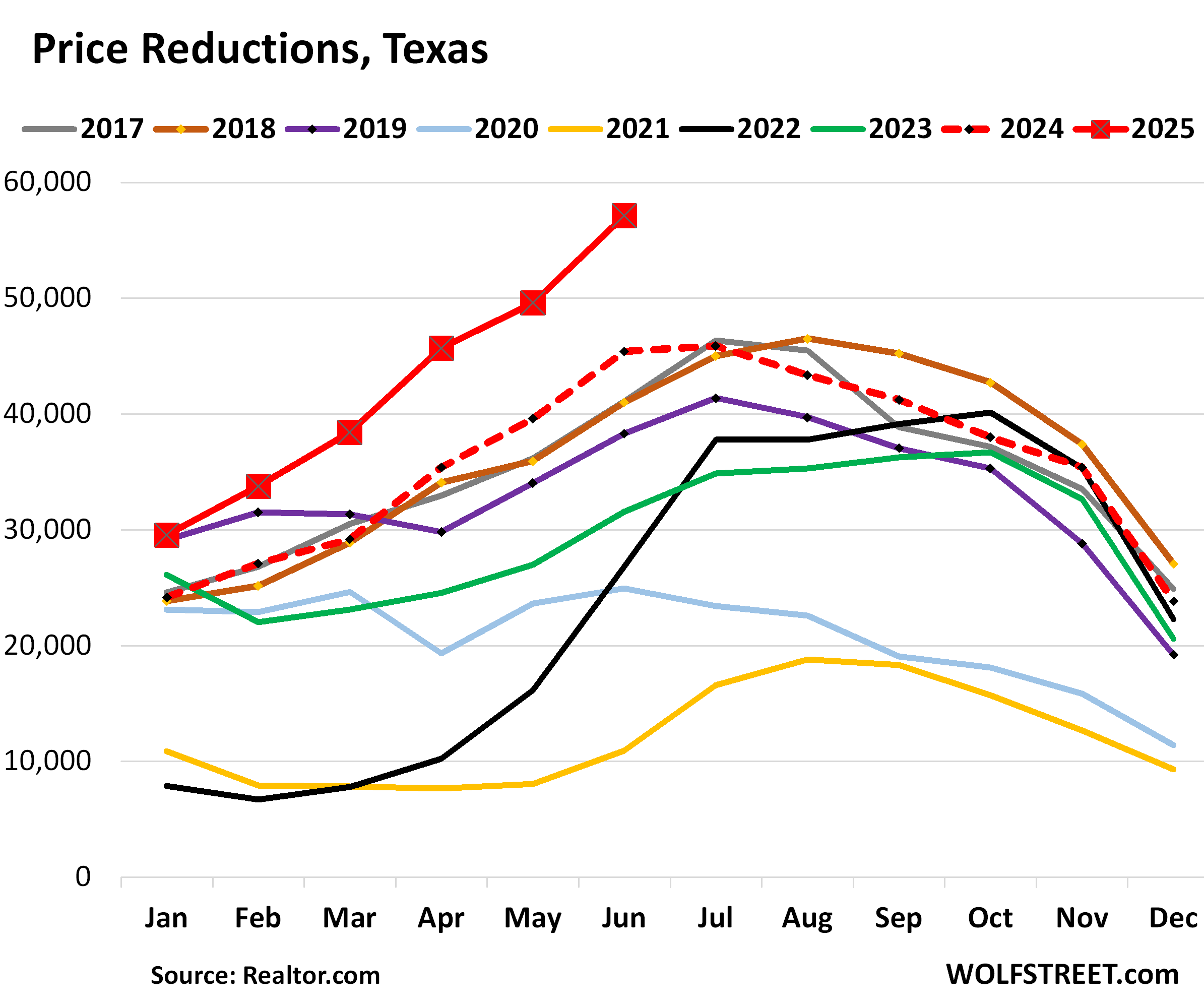
Inventory of homes for sale in Texas jumped by 27% from June 2024, by 33% from June 2019, and by 41% from June 2018, to 138,255 homes, by far the highest in the decade-long dataset from realtor.com.
During the housing frenzy in 2020 through the first half of 2022, inventory plunged to very low levels, as everyone was trying to buy, no matter what the price, while people who’d bought and moved into their new house then didn’t sell their old now vacant house in order to ride the price spike up all the way. That’s what caused the depletion of inventory on the market.
And those vacant homes now piling onto the market, after too-high prices have killed demand, has caused this spike in inventory.
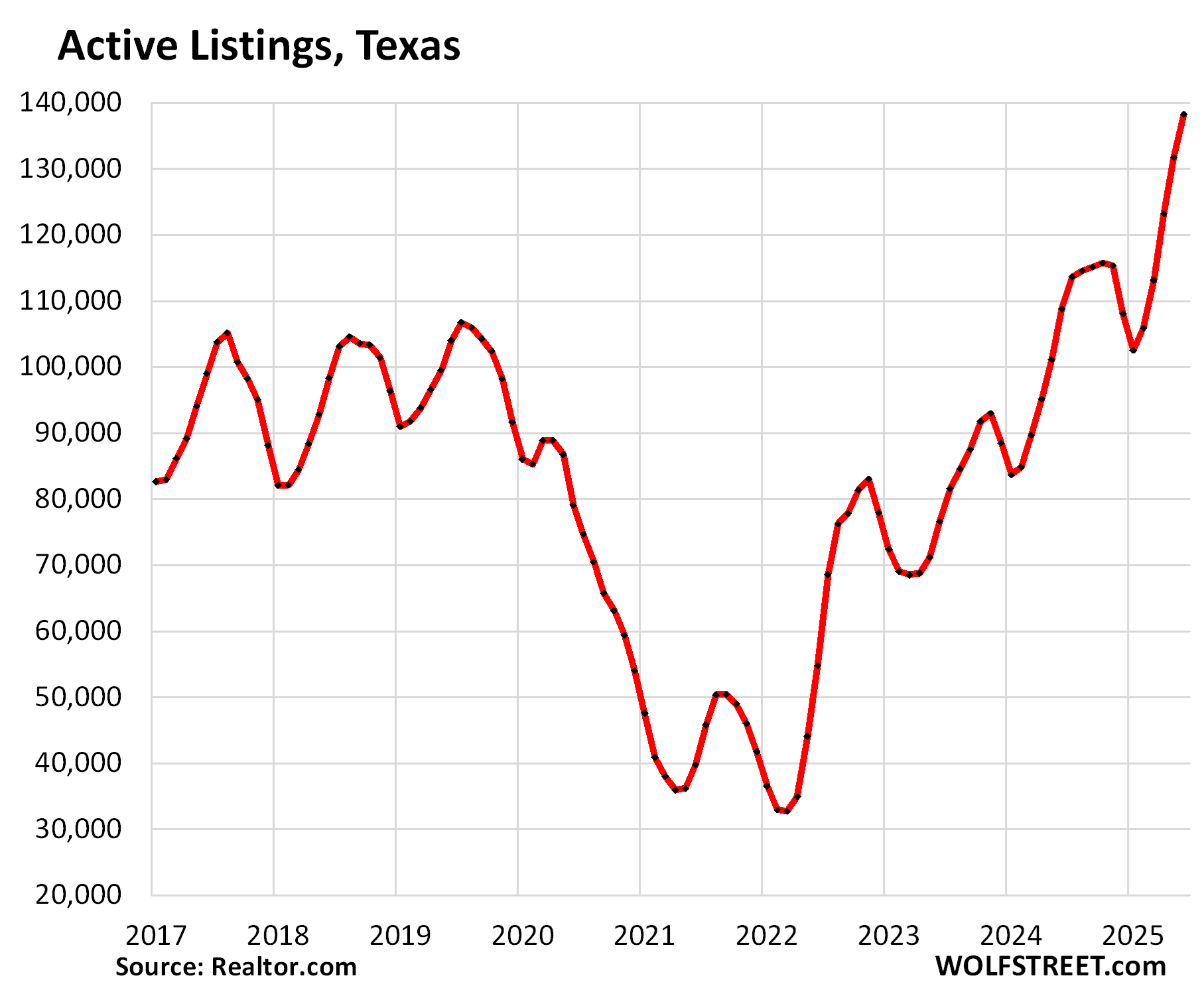
In the Dallas-Fort Worth-Arlington metro, active listings spiked by 67% year-over-year, to 30,998 homes, by far the highest in at least the decade of the data by realtor.com.
Compared to 2019, active listings are up by 47%, compared to 2018 by 86%, and compared to 2017 by 120%!
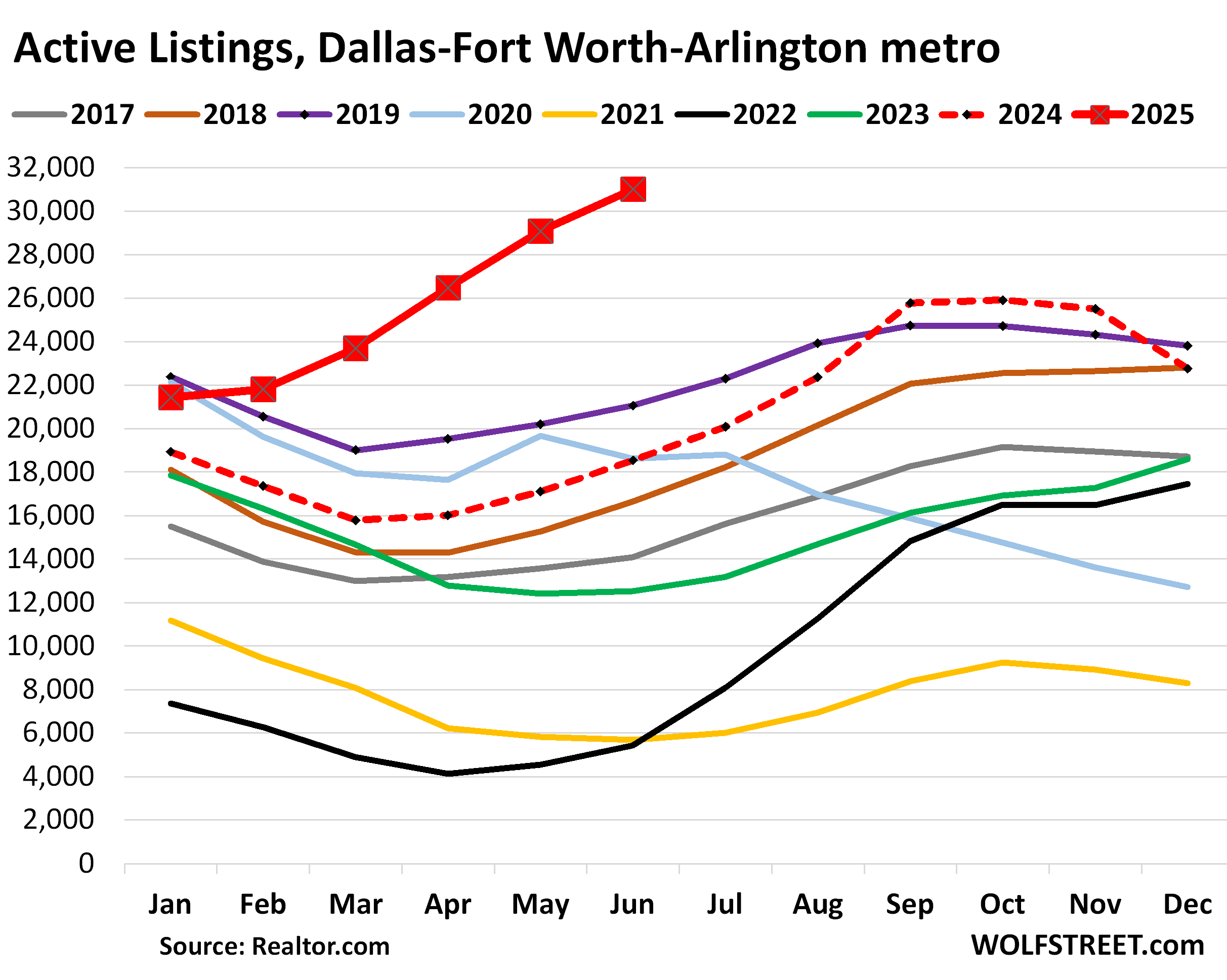
In the Austin-Round Rock-San Marcos metro, active listings jumped by 20% from the already hugely bloated levels in June 2024, to 13,105 homes, the highest in the decade of data by realtor.com. Compared to 2019, inventory was up by 70%!
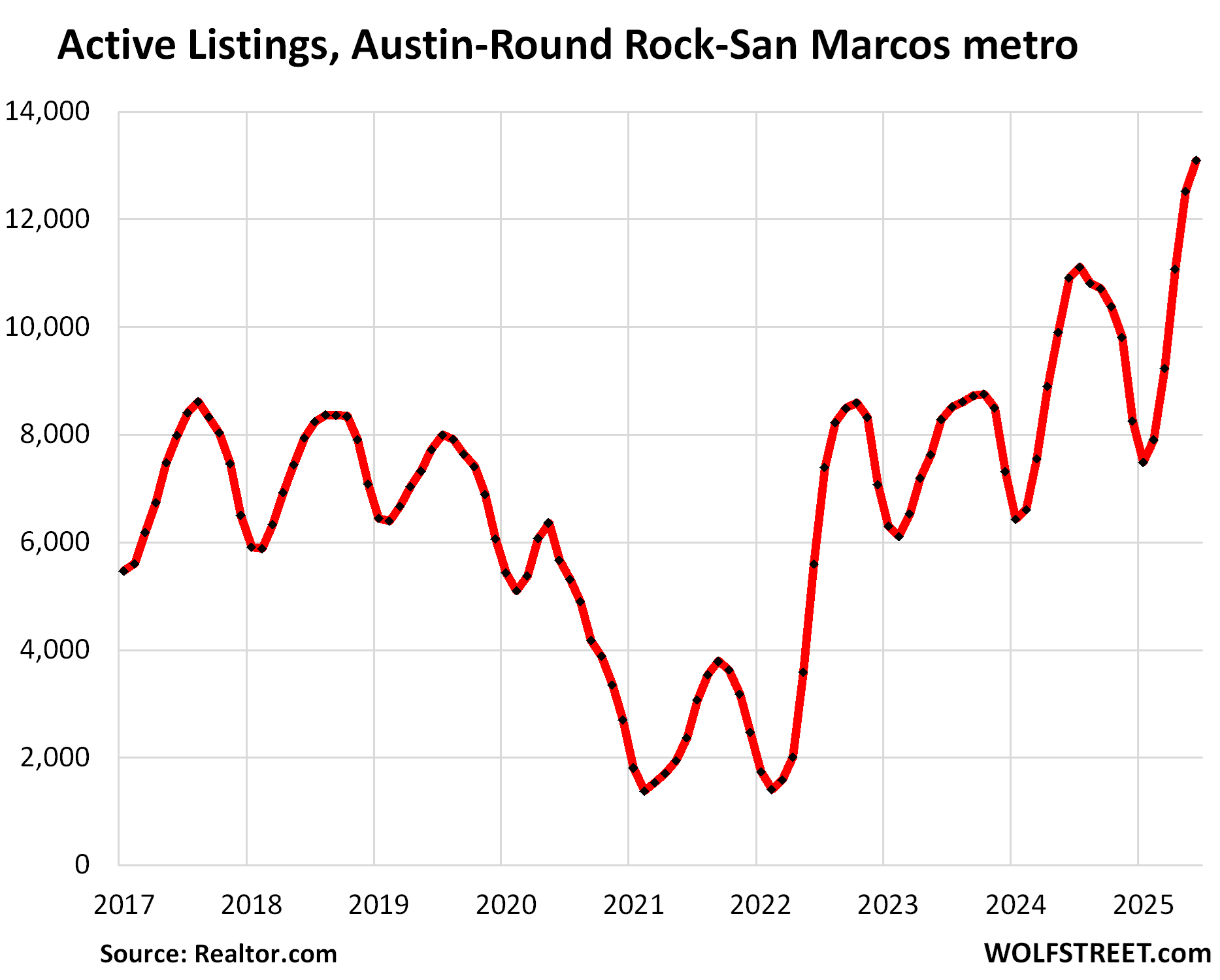
And the price cutting is getting serious, highest in at least the decade of the data by realtor.com:
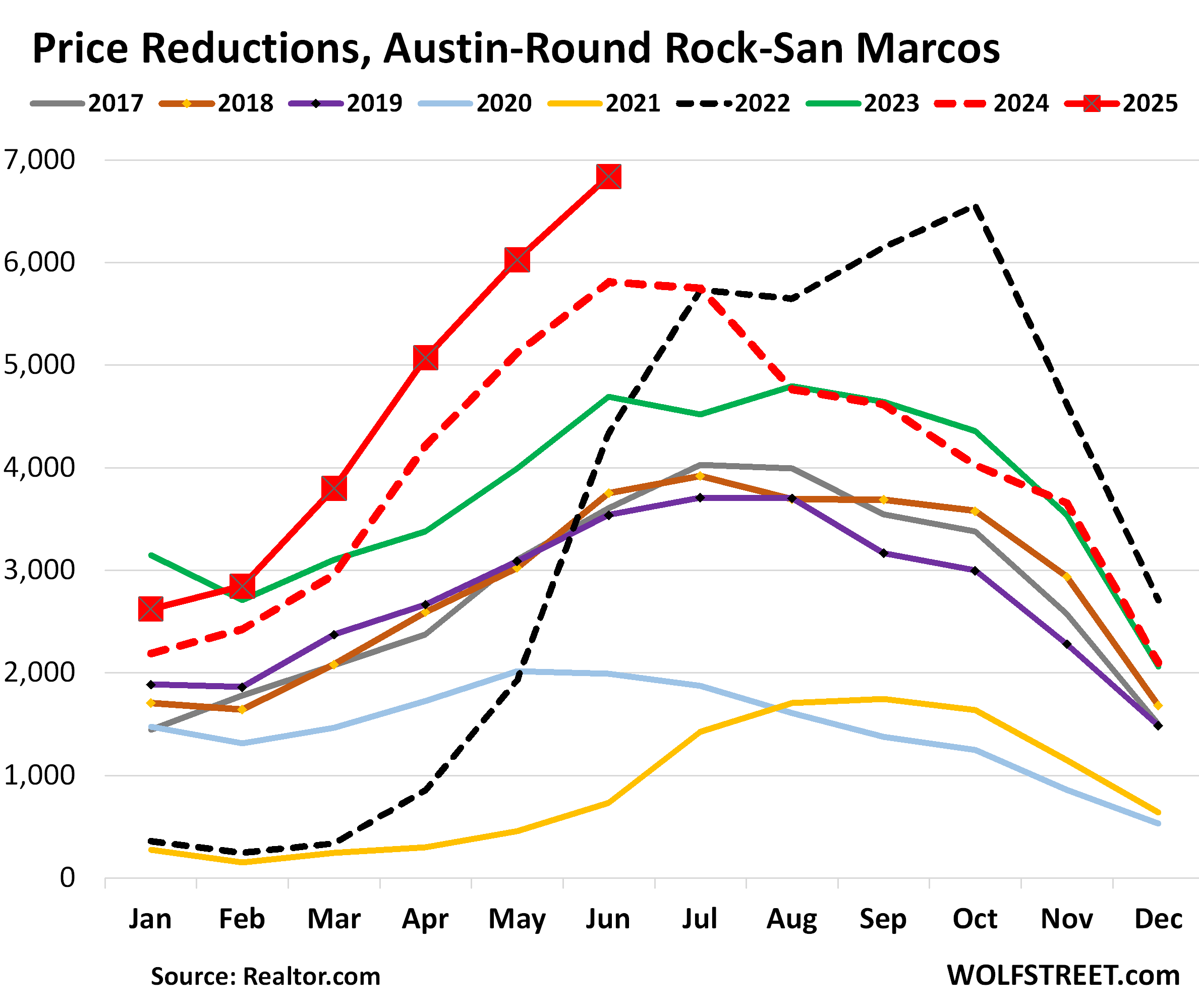
The Austin metro is ahead of other big metros in Texas and around the country: transaction prices, after exploding, have dropped already by 23% from the peak in June 2022 through May.
Housing price charts should never-ever look like this. That kind of price explosion as it occurred during the free-money era documents pure housing insanity triggered at the time by the government’s reckless fiscal policies and the Fed’s reckless interest rate repression through near-0% policy rates and massive QE even as inflation had begun to rage.
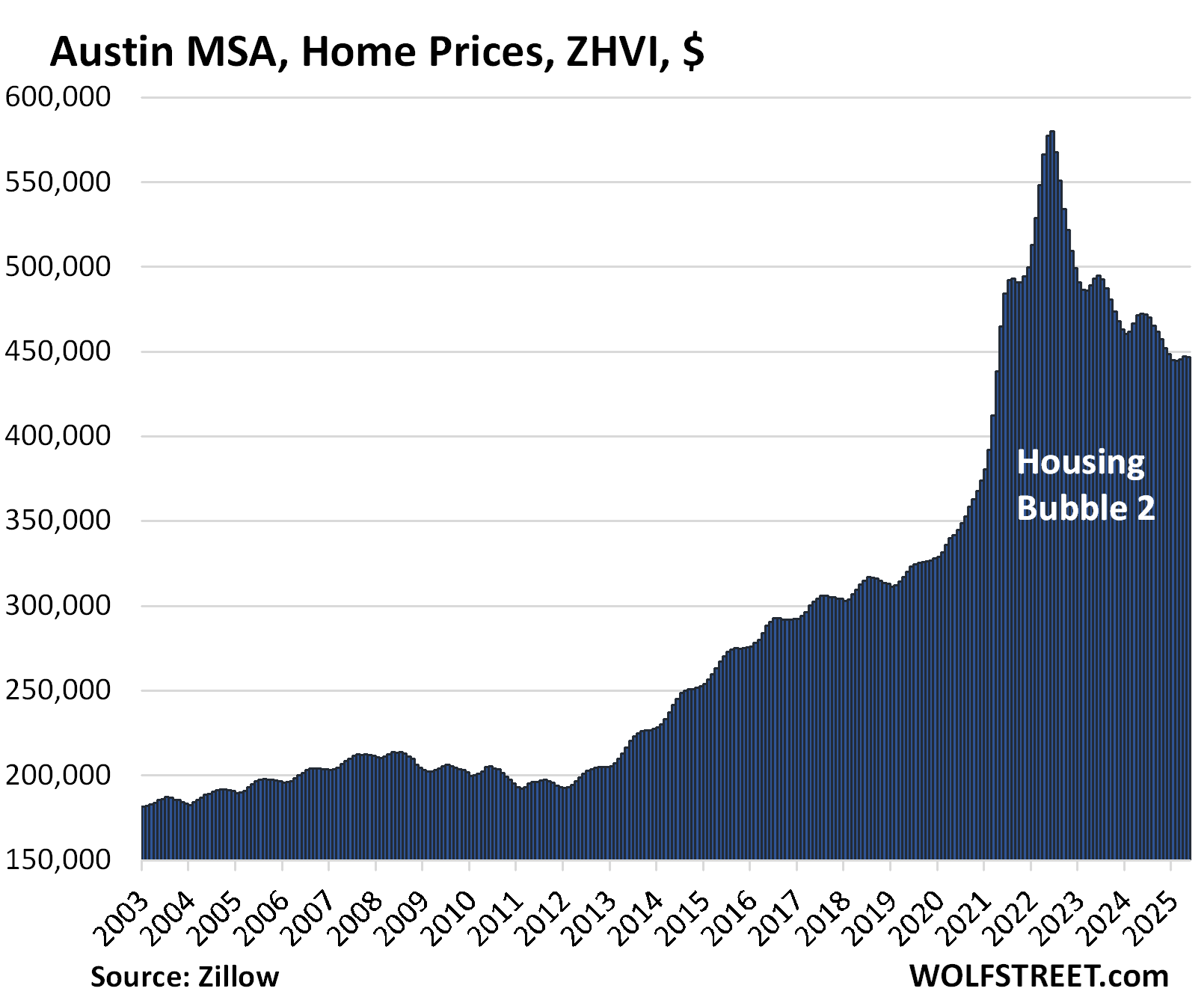
In the Houston-Pasadena-The Woodlands metro, active listings jumped by 32% year-over-year to 34,226 homes, the highest in the decade of data from realtor.com.
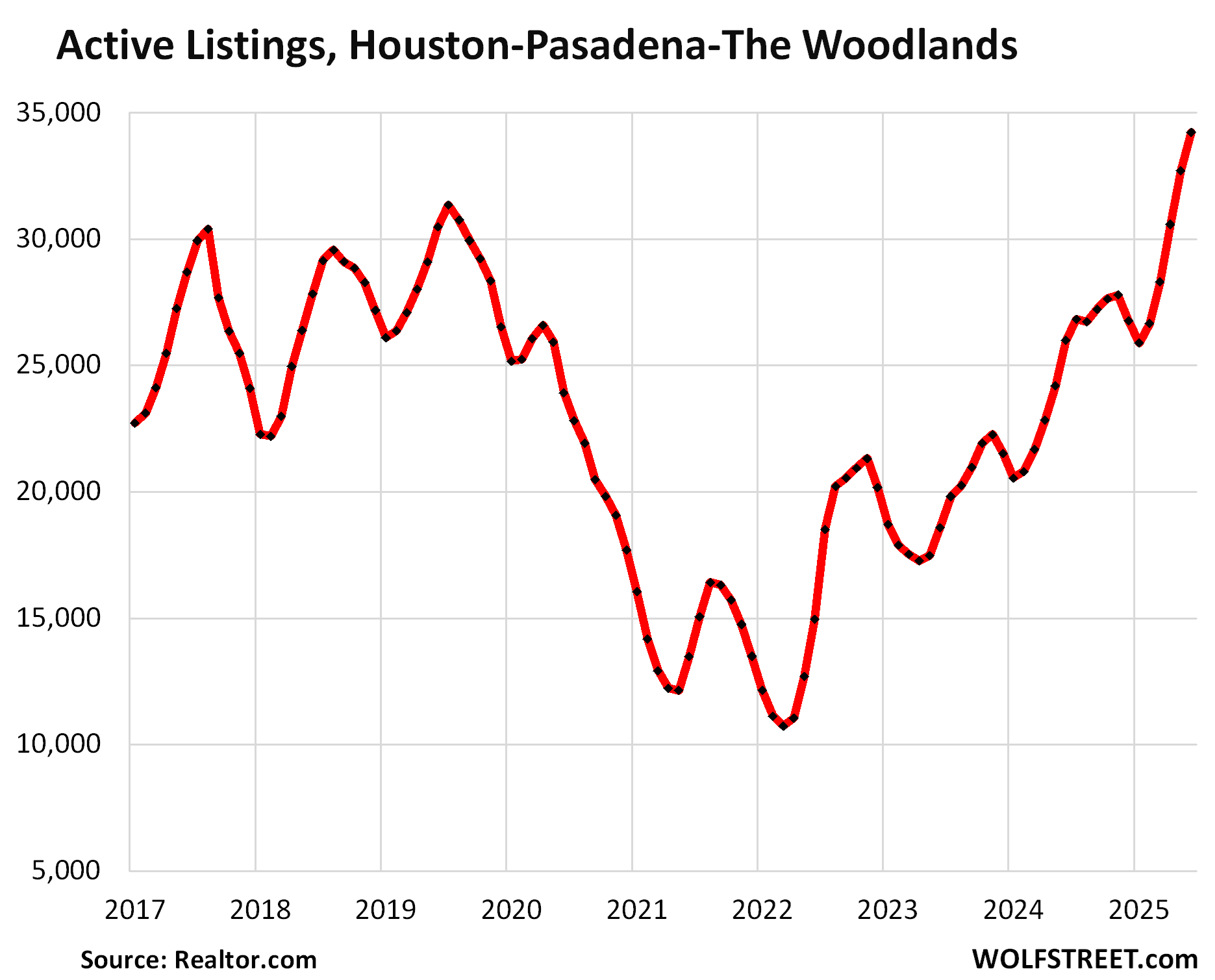
In the San Antonio-New Braunfels metro, active listings jumped by 18% from the already bloated levels a year ago that had already been at the time the highest in the decade of data from realtor.com.
Compared to June 2019, listings are up by 47%, compared to 2018 by 63%, compared to 2017 by 72%.
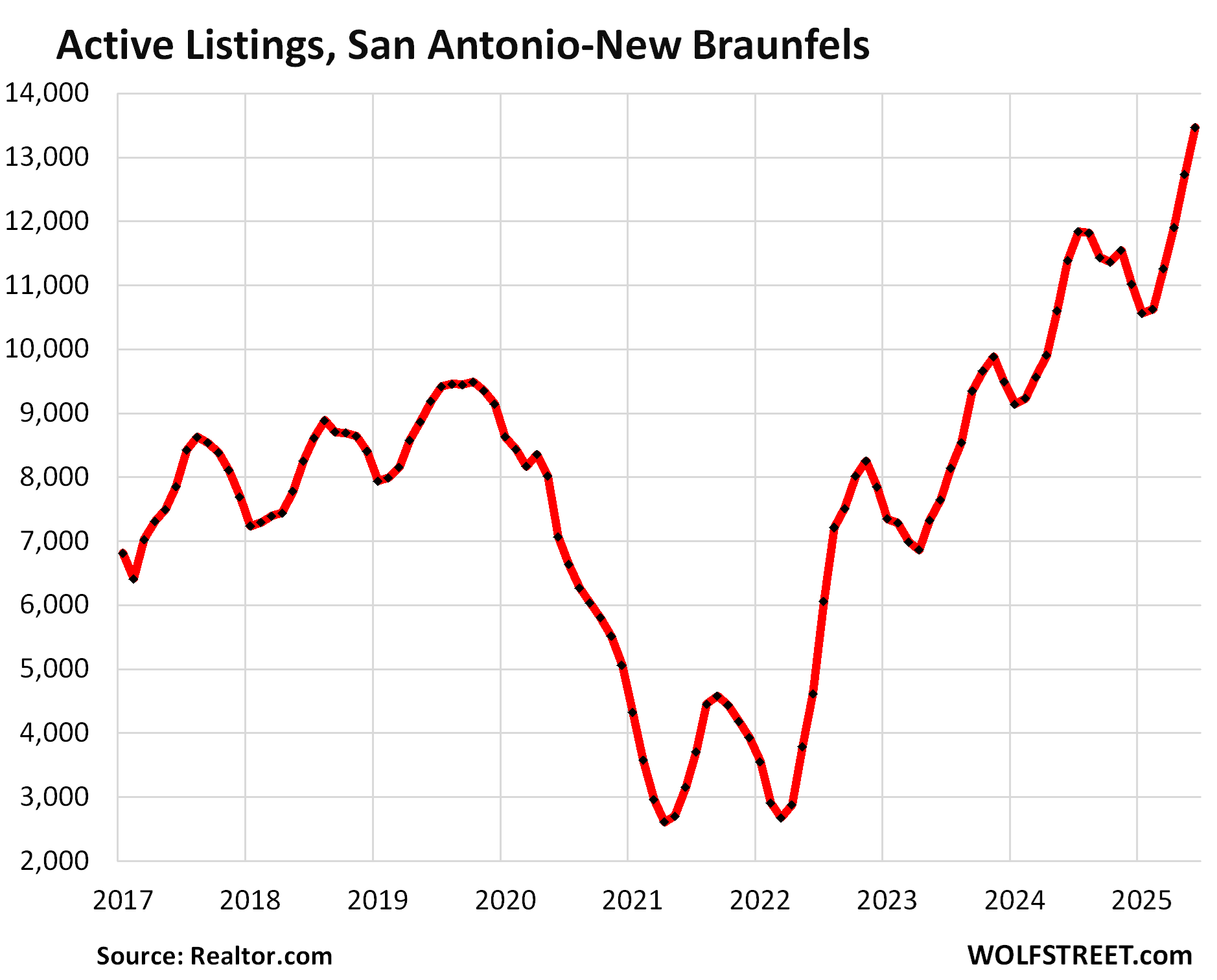
The decline in home prices has been slower in San Antonio than in Austin. Prices in the San Antonio metro have dropped so far by 9% from the peak in June 2022 through May:
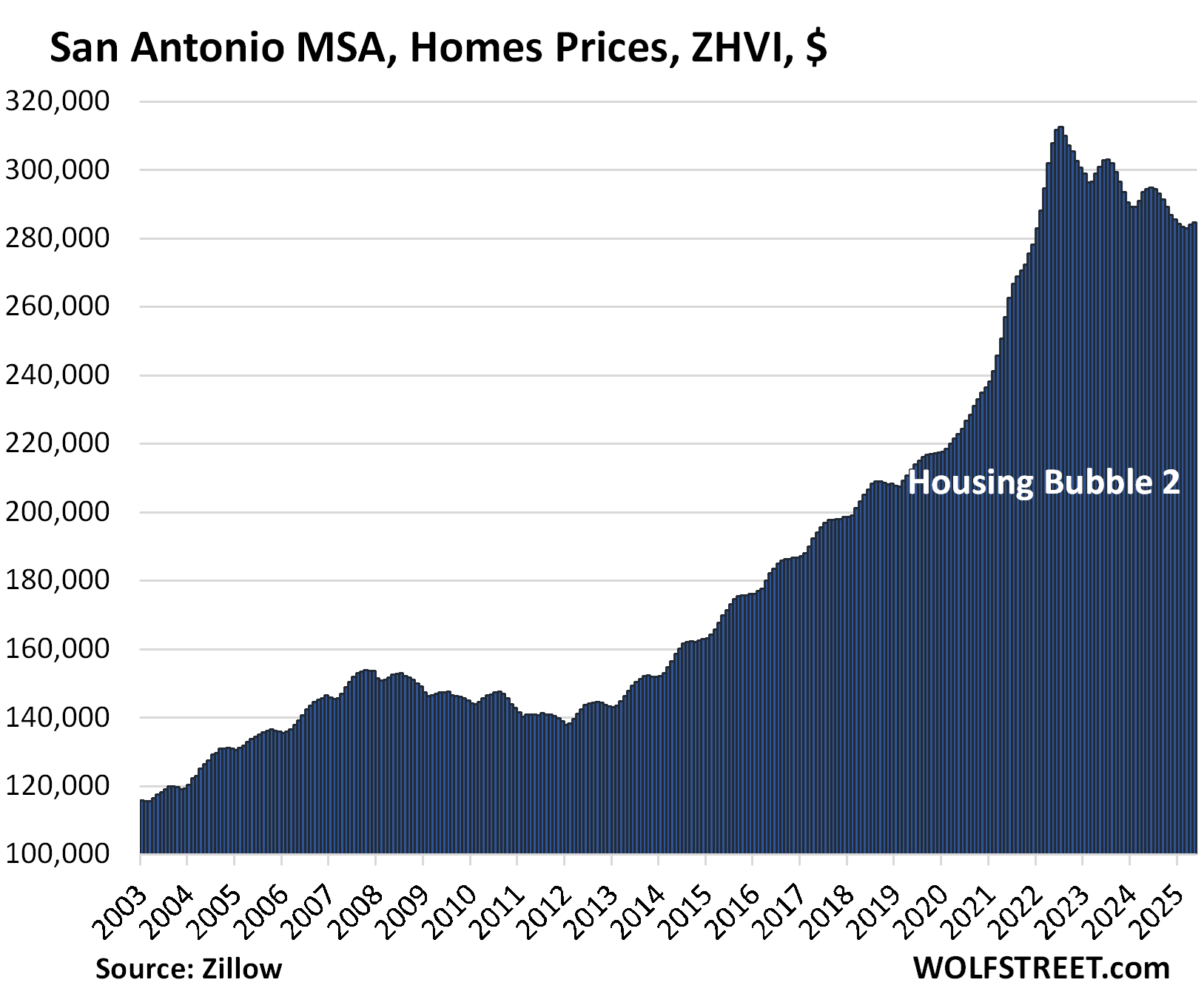
Hangover time. All the government’s free money is gone. Student loans have to be paid back, and they’re accruing interest again, forbearance is over, and arrearages are starting to mess up credit ratings again. Mortgage rates have been back in the historically normal-ish range for three years. Inflation is still out there, ready to dish up another nasty surprise. And what this free money has left behind is a huge mountain of government debt that needs to be financed and refinanced, with more debt getting thrown on top of it every week, and all this is putting upward pressure on long-term interest rates and mortgage rates. Home prices are now way too high and they have destroyed demand, though there is plenty of demand at lower prices.
The distortions in the housing market over these years cannot just vanish overnight without a trace. They will take years to work out along a bumpy road. But it’s good to see these inventories on the market again.
Enjoy reading WOLF STREET and want to support it? You can donate. I appreciate it immensely. Click on the mug to find out how:
![]()


Re: Hangover time
What blows my mind, after all this stupid pandemic circus excess — is the background noise about home builders ramping up new construction — and sweeping away all these overhanging, problematic post-pandemic conditions.
The new construction Kool-aid guzzling and cheerleading zealotry may have worked out ok in the midst of pandemic chaos, but I don’t think builders are gonna find as many people chasing unaffordable unicorn dream homes — especially with existing inventory exploding weekly.
Maybe, there’s a trend, for people to want newer homes, versus 50 year old boxes, but I still can’t fathom there’s a huge supply of buyers lining up to pay top dollar… for either product.
I think the hangover is just starting.
More inventory is exactly what this overpriced market needs. We need homes for sale out the wazoo for years to come. Bring on the inventory, build baby build. Single-family, multi-family … all of it.
What does it take to understand how many homes we actually need. What combination of population growth projections and other factors should we look at to know what an ideal number of homes need to be built in the next 5 years in a given region?
The US economy is based on gluts. It functions best in gluts. The shelves must always be full. What you order online must always be available from lots of vendors at a discounted price. Car lots must be full. Supply must always exceed demand by a large amount to keep prices down and provide choices. The more, the better… for consumers. Gluts create a competitive environment, they bring out the best in the US economy, and this housing market needs many years of this.
Google headlines like “The US housing market is short 6.5 million homes” from CNN in 2023.
4hens
That headline is complete stupid-ass bullshit paid for and promoted by the real-estate hype-and-bullshit industry and designed to be spread by braindead morons.
I cannot believe you fell for this manipulative shit.
New builders are offering crazy incentives to move their homes. I literally received an email from Taylor Morrison yesterday offering 3.75% 30 year fixed rate for their new builds – I live in FL.
Thank you Wolf 👍.
Really help to put things into perspective.
I wonder what LA, Orange County & San Diego will look like by the end of 2025.
What ALWAYS ticks me OFF about these housing price charts (nothing against the author!) is this: although there have been SOME price reductions, they are a very small fraction of what’s needed to return to normalcy and affordability. Texas home prices may be cheap compared to California prices, but how many working class Texans can afford to buy a house currently? Nationwide, there is a severe affordability crisis. High property taxes in Texas don’t help the situation there.
Many people forget the level of housing market devastation during the last housing bust. Overpaying for homes leads to affordability crises for many families as time goes on.
Money overpaid is savings delayed!
The price reductions matter only in that they show a state of mind. What really matters are selling prices. I post those a lot, chart after chart, including two in this article, one for Austin, where selling prices have dropped by 23%.
RTGDFA not just the headline
Back in 1991, I bought a house near San Antonio for $30,000. Nor was this unusual at that time. Almost anyone working could afford to buy a house and rents were comparably low. You hardly ever saw anyone who was homeless. That was a golden era never to be repeated again.
That’s about when I moved to Texas from California for a job (1994). We bought a nice 2,000 sq. ft., 5 year old home for about $80 K in The Woodlands (North of Houston) and it served my family well until the kids got out of college. It was a two story and my wife became ill and couldn’t get up the stairs very well so we sold it and bought a one level home of the same size.
Those 1990’s were a good time to live almost anywhere in the U.S.
These are good times in my slice of flyover.
The kids in the trades are doing great.
My children had no problems in purchasing homes.
Early 90s we were still busy shuttering our industrial parks and moving them south of the border.
Yeah, there was a decline in housing prices due to the S&L crisis. Homes didn’t take off until Greenspan eliminated legal reserves by 40 percent.
History does not repeat itself…
But it sure does rhyme!
The more this makes the news for the “cheaper” markets, the greater the probability buyers strike in the more expensive coastal areas.
My kid might be able to get a house in the PNW in a year (with dads help).
Lower house prices will be amazing for the people renting rather than be forced into debt slavery with a massive mortgage. I wonder if prices will get lower than the 2020 levels, and make the homeowners with sub 3% 30yr mortgages underwater. That should increase the refi’s back to a more normal level.
Side note: that Austin price chart looks a lot like an extended finger with 3 knuckles.
Fed Affordability Monitor shows households making the median income have to spend 46% of their GROSS income on median priced home mortgage payment. This is not sustainable and prices must come down.
Free money is gone, student loan payments resuming, increasing deportations, AI layoffs and hiring freezes in tech, return to office, spiraling insurance and HOA fees, property taxes resetting to post-inflation baselines.
Given these trends, where will the new demand come from for Texas and Florida housing?
Further erosion of the USD value?
For many Europeans US prices became very affordable.
The EUR-USD exchange rate is back where it had been in 2021 at $1.17 to €1.00. In 2020, it was $1.22, so now the US is less affordable than in 2020 for Europeans. There was a time when the euro was over $1.40. So now the EUR-USD exchange rate is maybe kind of back to normal?
lol now I’ve heard it all! The Europeans are gonna save the housing market. Hahaha .. thanks! I needed a good laugh
No mention of the Alamo!?
Great article. Up my way in the Greater Boston area we’ve seen inventory increase quite a bit compared with the last few years. Lots of new construction coming to market since spring (at nosebleed prices often well over 1 million). “Affordable” homes priced below 800k seem to be moving for the time being while more expensive new builds are just sitting. Price reductions and “back on market” listings are becoming more common. Considering all the tech jobs in my area, if AI related job losses can pick up steam we might see housing prices finally begin correcting here.
The Federal Reserve made HUGE errors by disregarding asset inflation, applying ZIRP for 6 years, stubbornly applying QE, buying mortgage securities, and allowing inflation to reach 9%. The errors are so huge and obvious, simple incompetency cannot explain it. I think we are dealing with a strong unspoken bias toward intervention and an inordinate fear of recession, combined with an irrational disregard of long term consequences and moral hazard.
I think there was also a level of hubris, that, if those negative consequences reared their ugly head, that they’d be able to make small changes and stop and even reverse them.
Agreed.
I believe they thought would be able to easily shut Pandora’s Box, operating either through ignorance, hubris, incompetence or malevolence.
What we need is the media to get behind the bubble popping story. The collective attitude towards housing seems to follow the mainstream media narrative. When it was rate cuts are coming sellers didn’t list because prices were just going to skyrocket again (per the media) because housing shortage. I think when the nationwide narrative becomes this is a bubble it will be a race to the door to get out while they can.
That and I think there’s still the sellers thinking rates will eventually come down, they can try again next year – but there’s a good chance that a rate cuts doesn’t change the 10 and 30yr rates and possibly even makes them go up….which I don’t think potential sellers realize. Minus a recession I don’t see the 10 or 30yr dropping.
There’s also a narrative that if rates drop, even to 5%, it’ll ignite buying activity and cause prices to skyrocket again.
I disagree. Those rates have already been “priced in” with the 3% rates. They never returned to normal, so I don’t see them increasing. I do so volume increasing, however.
I’ll also add the realtors I know are just terrible. First marry the house, date the rate. Now it’s a buyers market. On the buy side, I don’t understand why we actually need these people because I don’t see them as actually helping buyers make good decisions or know what a property is actually worth. Bid over asking is sure to close the deal and bring in a bigger commission check so why would they ever say oh that’s over priced?
Curious how things are working out for the date the rate crowd right now, with mortgage payment increases, insurance increases and property tax increases
When I can, I try to bypass them. Some dishonest seller’s agents want to protect their cartel, and won’t work with a non-represented buyer, but most will work with you.
Just read that Marjorie Taylor Green proposed eliminating the capital gains tax on homes. There is already an exemption of $250,000 for single people and $500,000 for married.
There is already a huge divide between homeowners and non-homeowners. Why make it worse?
Why shouldn’t someone who paid $350,000 for their house in Mountain View in 1986 and who sells it for $4 million today pay some taxes on it?
TSonder305
Because all of this price gain is just inflation. Why do you have to pay tax on inflationary gains? Good move by MTG.
Boo hoo.
Under that reasoning, why not compensate all asset holders (stocks, RE, gold, etc.) for inflationary gains and compensate those who suffer inflationary losses (bondholders, consumers, etc.)? Why provide an inflation subsidy only to homeowners sitting on large gains?
If you don’t like inflation, don’t vote for politicians that increase the deficit or support monetary debasement. Don’t ask for a special handout.
Don’t vote for politicians that build a bloated bureaucracy that
charges thousands in permit fees, and drags out the process for months.
Is she proposing to get rid of that with every other asset?
Good question.
The goal should be to increase housing supply permanently, not provide tax windfalls. Gain exclusions don’t increase total supply of housing. A tax break for new building would be a much better approach to increase supply.
But I’d rather see them eliminate all housing incentives altogether to minimize government intrusion in markets.
“Why shouldn’t someone who paid $350,000 for their house in Mountain View in 1986 and who sells it for $4 million today pay some taxes on it?”
Should the person paying $4 million today get to take a capital loss if they sell their home for $3 million in 2035? It’s a tax policy choice, but since owner-occupied homes are personal expenses capital losses aren’t deductible. The current capital gains exemptions are arbitrary, but they do mitigate to some extent taxes on inflationary gains. I don’t have a problem with Congress changing the exemption amounts in either direction, but it’s important to keep in mind capital gains taxes on personal residences already go in only one direction: gains are taxed and losses are ignored.
You want to increase housing supply ? How about
reducing demand from illegal immigration and
perhaps instituting a vacancy tax . Less demand
will lower prices quicker than more supply.
Funny how Wolf is starting to upset some of the bubblers on Reddit. Saw they posted this on REbubble, probably should be in bubblejerk sub instead…guess some people have so much invested, they get a little defensive when the data doesn’t match their narrative..I guess focusing on certain market is consider selective.
MarketCrache
•
9h ago
Wolfstreet is a permabear and is very selective with his stats.
“Permabear” LOL, I’m pretty bullish about home prices becoming more affordable over time (not overnight) for Americans.
Don’t put it past Trump to raise the homeowner exemption to 500k and $1,000k. You’ll see sellers list in droves
Rumors flying Powell is headed out. I know it’s speculation, but putting a full blown Trump yes man running the FED should light a fire in Bond yields, wouldn’t you think?
One thing about Trump, he doesn’t care who he throws under the bus. He a real loose cannon.
Permabears are the people thinking home prices will go even higher and average new home buyer being in their mid 40s is a good thing.
A pessimist is someone who thinks we shouldn’t have a caste system split between people who bought before covid and people who didn’t.
Texas vs Florida.. which state will crash first?